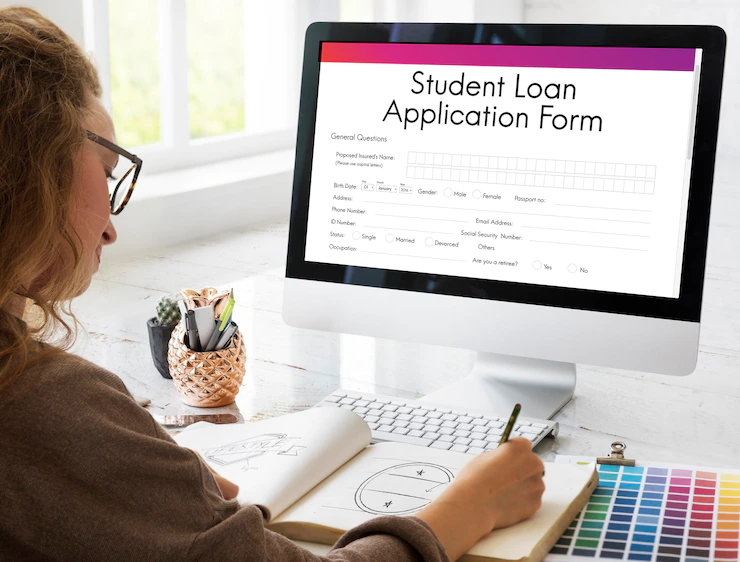Are There Student Loans Available Without A Cosigner?
4 Mins Read
Published on: 14 June 2022
Last Updated on: 10 September 2024

toc impalement
Student loans can be one of the scariest parts of entering college, especially amidst an economic landscape where inflation is rising and tuition prices are steadily increasing.
Higher education has always been expensive, and countless students choose to take out loans every year to pay for a degree that they hope will help them make more money in the future.
They are a fact of reality for many, but still, the world of student loans can be difficult to navigate, even in a digital age where information is readily available at our fingertips.
This article aims to explain some of the basics of student loans and how they can impact both students and their families.
Types Of Student Loans

There are generally two types of student loans in the United States: federal student loans and private student loans.
Federal student loans are loans offered by the government which is made available upon completion of the Free Application for Federal Student Aid at studentaid.gov, which uses a student’s financial information to calculate what federal aid opportunities they qualify for, as they are often need-based.
These federal aid opportunities include student loans which are offered at generally lower interest rates and include federal protections like access to deferment and forbearance options.
However, there are limits to how much money a student may take out in federal loans depending on the type of loan, what year in college they are in, and other factors, so sometimes, especially if the student is attending an expensive private institution, the money offered is not enough to cover the costs of college.
Private student loans are often available in higher amounts to students, but they do not necessarily come with the same protections offered by federal student loans.
This does not mean that borrowers from private student lenders are at any sort of inherent risk, but it does mean that anyone considering lending from a private institution should thoroughly study the implications of their loan agreement to avoid being caught off-guard by any special conditions or fees which may apply to their loan.
Some private lenders offer programs that are similar to federal loan safeguards, so it might be worth speaking to a representative about any potential options of that nature for borrowers.
What Is A Cosigner?

A cosigner is sometimes a requirement for private student loans: since student loans are often made to individuals who are either 18 or 19 and entering college straight out of high school, the individual student does not have enough credit history or a history of reliability and financial stability important to lenders.
As stated by an Investopedia blog post which can be found here, often private loans have borrowing limits that are much higher than that of federal loans. So, when making decisions about who they lend money to, they may ask the student as a potential borrower to provide a third party that will claim legal responsibility for the loan if the student is ever in a situation where they are unable to make payments.
This party is often the student’s parent, but there is no specific rule to that sentiment: a cosigner may be a distant relative or a close family friend.
The cosigner might also be asked to fulfill certain financial requirements such as meeting a set annual income or having above a certain credit score, but these conditions will vary from institution to institution.
Government loans are able to be offered with lower interest rates because they are often subsidized, which means that taxpayer money is used to lower the overall cost of giving out a loan.
Since private institutions do not have such resources, so they need to garner additional reassurance that any parties to which they choose to lend money to will be able to pay them back.
The cosigner assumes legal responsibility for the loan if the primary party does not pay, which can mean that the cosigner will either be forced to pay any missed payments or in extreme cases the full amount of the loan.
Are Cosigners Always Necessary?

Some students may elect to find private student loans which do not require a cosigner for many reasons. For example, a private student loan can impact the cosigner’s credit score, it may be too expensive to add to the cosigner’s expenses, or they don’t want to risk the assets they have.
Cosigners are a part of many private student loan offers. However, cosigners are not necessarily required for every student loan made from a private institution: there do exist student loans without a cosigner, but whether a loan will require a cosigner can depend on the full amount of the loan, the institution from which it was lent, and the student’s own financial situation.
It can be more difficult to find these loans, so it is important for any potential borrower to know exactly what the terms of a loan are before agreeing to anything. A student can make their chances of being offered a student loan without a cosigner by demonstrating financial responsibility before starting college.
They may do this by building their credit score or even working part-time during their semesters, on breaks, or both. They may also choose during high school to save up money to then include in their loan application.
It will help to tell agents during the loan application process that you are in search of specifically a loan that does not require a cosigner.
Read Also:


















Comments Are Closed For This Article